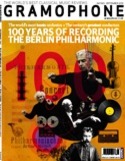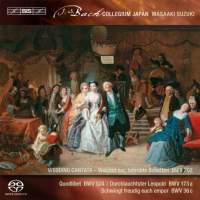Texte paru dans: / Appeared in:
*

GRAMOPHONE (09/2013)
Pour s'abonner /
Subscription information
BIS
BIS2041

Code-barres / Barcode : 7318599920412
Reviewer: Lindsay
Kemp
Suzuki Bach cycle
alights on the secular cantatas
A third volume of secular cantatas finds the Bach Collegium Japan
celebrating red-letter days of people who would surely have been surprised
at still being honoured nearly 300 years later. Presumably Bach agreed,
since he later ‘rescued’ the music from two of these works to make church
cantatas, the exception being BWV202, the famous ‘Wedding Cantata’ for solo
soprano and obbligato oboe. This is sung here by Joanne Lunn, currently one
of the most straightforwardly attractive Bach voices around; although
slightly covered at the start by a surprisingly heavily handled oboe (much
better in its second aria), she can mostly be enjoyed in heartwarming
radiance and clarity. She also shines in BWV173a, a piece praising Bach’s
employer Prince Leopold of AnhaltCöthen, in which her bright innocence
echoes the dancing flute-and-violin lightness of the music. This is not
high-flown stuff but exudes the kind of carefree happiness Bach seems to
have enjoyed at the Cöthen court. Roderick Williams is a dependable and
manly companion in this work, and the two of them are joined by the light
but firm tenor Makoto Sakurada,
together with a chorus, in BWV36c, a longer and more self-consciously dignified creation lauding the birthday of some Leipzig professor or other. Serious it may be but there are some lovely things here, none more so than the nineminute aria for soprano and tenderly doting viola d’amore.
As ever, Suzuki and colleagues are excellent, their collective experience as Bach interpreters enabling them to gel as one. You feel you are ever safe in their hands; but if you think that simply means no surprises, listen to them cut loose in the lusty Wedding Quodlibet, an in-jokefuelled nonsense-fest for four voices and continuo, probably written for a Bach family wedding. Its original concluding fugue has gone missing but BCJ have found a witty way to acknowledge its former presence. I won’t spoil things by describing it here.
Cliquez l'un ou l'autre
bouton pour découvrir bien d'autres critiques de CD
Click either button for many other reviews


